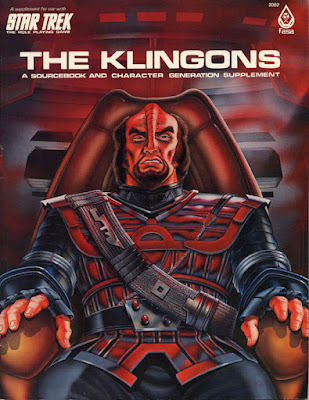Retrospective: The Klingons
 I was quite young when I first encountered Star Trek – perhaps five or six years old. I did so thanks to a paternal aunt who watched it during its original 1966–1969 run, when she was still a teenager. Episodes of the show were a staple of Saturday afternoon syndication during the 1970s and, through them, my aunt introduced me to Gene Roddenberry's masterpiece. I was instantly hooked and, for a long time afterward, I'd proudly call myself a fan.
I was quite young when I first encountered Star Trek – perhaps five or six years old. I did so thanks to a paternal aunt who watched it during its original 1966–1969 run, when she was still a teenager. Episodes of the show were a staple of Saturday afternoon syndication during the 1970s and, through them, my aunt introduced me to Gene Roddenberry's masterpiece. I was instantly hooked and, for a long time afterward, I'd proudly call myself a fan. Consequently, the release of FASA's Star Trek RPG in 1983 was a momentous event, combining as it did my childhood love of the Final Frontier with the hobby of roleplaying to which I'd been later introduced. I can still remember the time spent playing the roleplaying game with my friends and could even now, if pressed, recount in detail the adventures of the USS Excalibur (II) and its crew. Suffice it to say that much fun was had, thanks in no small part to the excellent adventures and source material FASA produced for the RPG over the course of the time the company held the license.
Among these, one of my favorites is the 1983 boxed set entitled simply The Klingons. As you might expect from its title, The Klingons was an expansion of the basic game, enabling players to generate Klingon player characters for use in a Klingon-based campaign. To do this successfully, the expansion had to provide more than just new rules and tables; it also had to provide plenty of details about the Klingon Empire and its society and culture. You must remember that, at the time, there was very little to go on, just a handful of episodes and a single movie in which the Klingons played a role. This meant that it fell to writers John M. Ford, Guy McLimore, Greg Poehlein, and David Tepool to fill in a lot of blanks in the space of the 64-page sourcebook included in the boxed set.
Fortunately, they were more than up to the job and the end result was a remarkable piece of work, one that made the Klingons more than just mustache-twirling villains. Instead, we learn about the Klingon belief in "the naked stars" that keep watch over great deeds performed beneath them, as well komerex zha, "the perpetual game" that governs one's place within the Empire and its hierarchy, and much more. As presented in The Klingons, the Empire operates according to its own internal logic, one based, to a large extent, on the philosophy of "grow or die," hence the Klingon emphasis on – or need for – conquest. Internally, there is a constant jockeying for power between individuals and power groups, with order imposed through a combination of propaganda, fear, and brute force. It's a brutal, cutthroat society but it makes sense by its own lights, which is important for the players to believe in it enough to play an adventure or campaign within it.
The Klingons also includes a couple of sample adventures, each of which demonstrates the kinds of adventures one might undertake as a member of the Klingon Imperial Navy. In a way, they're like a funhouse mirror version of Starfleet. There is new to subjugate and new civilizations to war upon, as well becoming involved in the great game of power and influence within the imperial hierarchy. It's probably not to everyone's taste, but, for many, it's a welcome change of pace from the high-minded ideals of the Federation and the do-gooders of Starfleet.
My friends and I didn't spend much time playing as Klingons, but, when we did, we had fun. More than that, though, it gave us all a better understanding of who these aliens were and how their Empire operated, which was a terrific boon when they served as antagonists in Starfleet adventures. John M. Ford would later write a Star Trek novel, The Final Reflection, which built on the ideas presented in this boxed set. It's probably one of the best Star Trek novels ever written – a low bar, I know – and I've often felt, without much evidence, to be sure, that it has subtly influenced subsequent portrayals of the Klingons in the Star Trek franchise. Regardless of the truth of that, the fact remains that The Klingons is a masterclass in in how to expand upon existing source material to produce something genuinely imaginative for use in a roleplaying game. Nearly three decades later, it has few rivals.
James Maliszewski's Blog
- James Maliszewski's profile
- 3 followers



